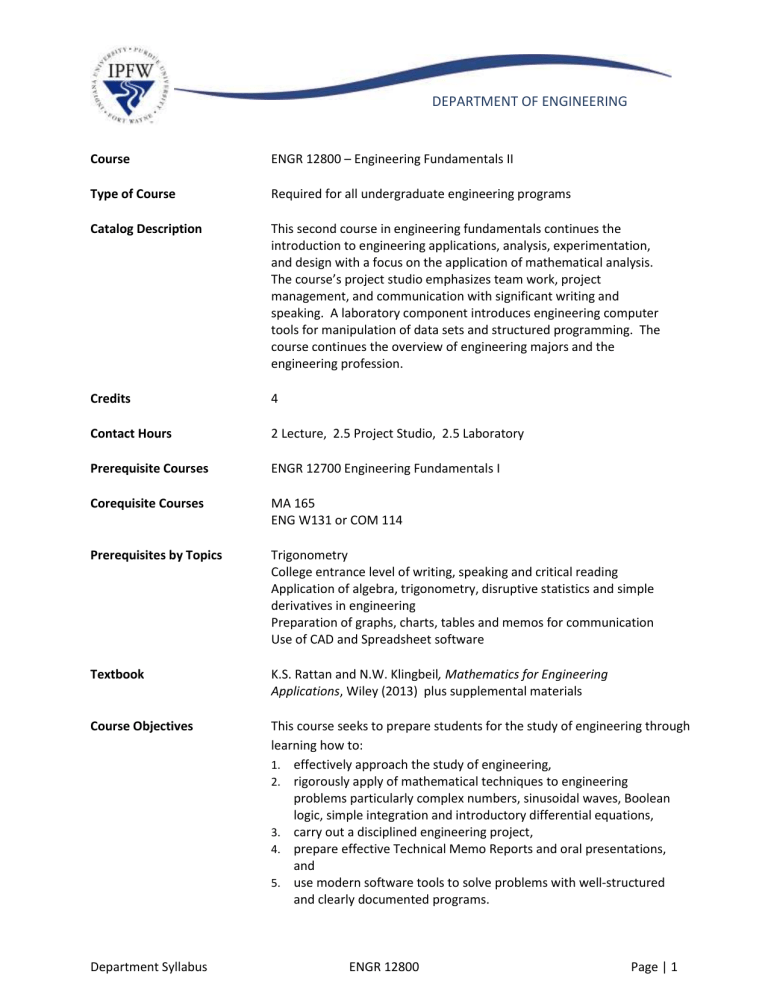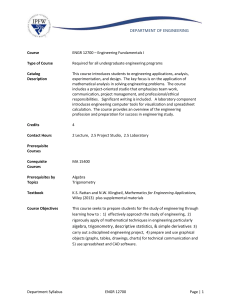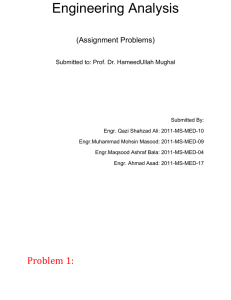DEPARTMENT OF ENGINEERING

Course
Type of Course
Catalog Description
Credits
Contact Hours
Prerequisite Courses
Corequisite Courses
Prerequisites by Topics
Textbook
Course Objectives
DEPARTMENT OF ENGINEERING
ENGR 12800 – Engineering Fundamentals II
Required for all undergraduate engineering programs
This second course in engineering fundamentals continues the introduction to engineering applications, analysis, experimentation, and design with a focus on the application of mathematical analysis.
The course’s project studio emphasizes team work, project management, and communication with significant writing and speaking. A laboratory component introduces engineering computer tools for manipulation of data sets and structured programming. The course continues the overview of engineering majors and the engineering profession.
4
2 Lecture, 2.5 Project Studio, 2.5 Laboratory
ENGR 12700 Engineering Fundamentals I
MA 165
ENG W131 or COM 114
Trigonometry
College entrance level of writing, speaking and critical reading
Application of algebra, trigonometry, disruptive statistics and simple derivatives in engineering
Preparation of graphs, charts, tables and memos for communication
Use of CAD and Spreadsheet software
K.S. Rattan and N.W. Klingbeil, Mathematics for Engineering
Applications, Wiley (2013) plus supplemental materials
This course seeks to prepare students for the study of engineering through learning how to:
1.
2.
3.
4.
5.
effectively approach the study of engineering, rigorously apply of mathematical techniques to engineering problems particularly complex numbers, sinusoidal waves, Boolean logic, simple integration and introductory differential equations, carry out a disciplined engineering project, prepare effective Technical Memo Reports and oral presentations, and use modern software tools to solve problems with well-structured and clearly documented programs.
Department Syllabus ENGR 12800 Page | 1
Course Learning
Outcomes
Department Syllabus
After successfully completing this course, students should be able to:
Lecture
1.
formulate and solve engineering problems using complex numbers (a)
2.
formulate and solve engineering problems using sign waves & frequency (a)
3.
formulate and solve engineering problems using integration (a)
4.
formulate and solve engineering problems using Boolean Logic (a)
5.
formulate and solve engineering problems using (linear-inparameters) empirical fitting (a)
6.
formulate and solve engineering problems using simple differential equations (a)
7.
solve and document the solution of problems involving different configurations (e)
8.
solve problems using multiple approaches (e.g., equations including varied analytic approaches, diagrams, formal solution steps or simple computer programs) (e)
9.
describe the broad nature of various engineering majors and the engineering profession and use this information to make appropriate career choices. (f)
Studio
1.
plan and carry out a disciplined design project following a systematic design process (c)
2.
Utilize appropriate analytical and computer tools in project work
(k)
3.
write a precise and effective Technical Report Memo. Write clear
Abstract, Methodology, Recommendations, and Conclusions sections (g)
4.
prepare and deliver an effective oral technical presentation (g)
5.
organize an effective team including setting ground rules, project planning, and task management; explain and utilize effective group processes (d)
Laboratory
1.
solve engineering problems using computer tools (k)
2.
apply arrays and array manipulations (k)
3.
use and explain files and data structures (k)
4.
write a function with multiple inputs and outputs at the command line (k)
5.
write a function that results in a non-numerical output
6.
write programs using logical expressions and conditional statements (k)
7.
write programs using loop structures (k)
8.
fit data that follows linear, quadratic, or power law forms (k)
9.
properly communicate a solution based on computer calculation or program (k)
ENGR 12800 Page | 2
Lecture Topics
Studio Topics
Laboratory Topics
Computer Usage
Laboratory Experience
Design Experience
Coordinator
Date
1.
Review of engineering analysis from ENGR 12700
2.
Engineering applications of complex numbers
3.
Engineering applications of sinusoids and waves
4.
Engineering applications of simple integration
5.
Engineering applications of Boolean Logic
6.
Engineering applications of empirical modeling (linear-inparameters)
7.
Engineering applications of simple differential equations
8.
Engineering majors & jobs
1.
Design process
2.
Writing technical memo reports
3.
Writing abstract, methodology, recommendations, and conclusions sections
4.
Oral technical presentations
5.
Teamwork
1.
Working with arrays and files in computer programs
2.
Writing computer functions and sub-functions
3.
Writing programs with branching
4.
Writing programs with loops
5.
Fitting simple empirical models
6.
Documenting a computer problem solution
High
Low
High
S. Scott Moor, Ph.D., P.E. , moors@ipfw.edu
(260) 481-6020
March 17, 2015
Department Syllabus ENGR 12800 Page | 3

